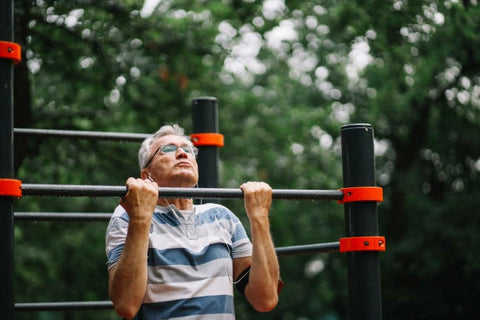What Type of Pull-Up Works the Chest?
What Type of Pull-Up Works the Chest?
Pull-ups are one of the most effective and versatile exercises for building upper body strength. While primarily targeting the muscles in the back, pull-ups also engage several other muscle groups including the biceps, triceps, and shoulders. However, many fitness enthusiasts often question whether there is a specific type of pull-up that focuses on the chest muscles. In this press release, we will explore different variations of pull-ups and their impact on chest muscle development.
1. Wide-Grip Pull-Ups:
Wide-grip pull-ups are characterized by a grip width that exceeds shoulder width, typically about 1.5 to 2 times the shoulder width. This variation primarily targets the lats, or the large muscles of the back, but it also provides secondary stimulation to the chest muscles. When performed correctly, wide-grip pull-ups activate the pectoralis major, the main muscle responsible for chest movement. However, the chest muscles' involvement may vary depending on an individual's form, technique, and specific muscle recruitment patterns.
2. Close-Grip Pull-Ups:
In contrast to wide-grip pull-ups, close-grip pull-ups involve hand placement that is narrower than shoulder-width. This variation effectively shifts the focus from the back to the forearms, biceps, and upper chest muscles. The close-grip pull-up targets the clavicular head of the pectoralis major, which plays a significant role in chest development. Incorporating this type of pull-up into a routine can help strengthen and enhance the upper chest region.
3. Neutral-Grip Pull-Ups:
Neutral-grip pull-ups are performed with palms facing each other and the hands gripping parallel bars or handles. This grip variation predominantly targets the middle fibers of the latissimus dorsi (mid-back muscles) while also engaging the biceps and shoulders. While neutral-grip pull-ups don't directly target the chest muscles, they can indirectly help chest development by strengthening the back muscles that provide stability during chest exercises like bench presses and push-ups.
4. L-Sit Pull-Ups:
For an added challenge, L-sit pull-ups can be incorporated into one's workout routine. This variation requires lifting the legs in a front-facing L-shaped position while performing the pull-up. By engaging the core and lower body in addition to the upper body, L-sit pull-ups effectively work the chest, back, biceps, and abs. The chest muscles are activated to stabilize the body and assist in the upward movement.
5. Weighted Pull-Ups:
To further intensify the workout and maximize chest engagement, weighted pull-ups can be incorporated. By adding additional resistance in the form of a weight belt or vest, one can progressively overload the muscles and stimulate chest muscle growth. When performing weighted pull-ups, proper form and control are essential to avoid injury and achieve maximum effectiveness. Consulting with a fitness professional or trainer is recommended when incorporating weighted exercises into a routine.
It is important to note that although pull-ups provide some activation of the chest muscles, they should not be the sole focus for chest development. The chest muscles respond best to exercises that specifically target them, such as bench presses, dumbbell flyes, and push-ups. However, incorporating different variations of pull-ups into a comprehensive strength training routine can provide significant benefits in overall upper body strength and muscle development.
For further expert advice and personalized guidance on incorporating the right exercises into your fitness routine, consult with a certified fitness professional or personal trainer.
Fitbeast is a leading provider of fitness resources, equipment, and expert advice for individuals looking to achieve their health and wellness goals. With a team of experienced trainers and an extensive range of workout equipment, Fitbeast is committed to helping individuals achieve their full fitness potential.
For more information about FitBeast, please visit fitbeastclub.com
If you need additional assistance, please contact:
Email Address:service@fitbeastclub.com
WhatsApp: +86 18038159034
Facebook Group: https://www.facebook.com/groups/fitbeastgroup.










